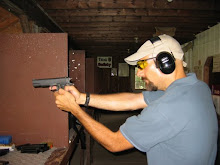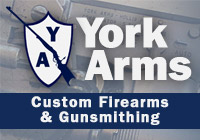Let's talk about keeping of records, shall we? Now, I don't mean the Guinness Book kind, I'm talking about firearms records. Keeping a proper record of firearms is something that rarely comes up in the gun blogosphere; there's rarely a rousing debate between the followers of electronic files vs. the adherents of paper trails. And, more than likely, it's not something you'll ever need.
But, much like the firearm itself, if you ever do need your paperwork and you don't have it, you're in a world of hurt...
Now, I'm a C&R holder. I have to keep records as part of the C&R license parameters, at least with regards to firearms that are C&R eligible that I acquire or dispose of while I hold the Class 03 FFL. This means a Bound Book of some sort in addition to the paperwork needed for the state (Firearms Transfer Form) and the Feds (4473 if not purchased directly using the 03FFL). All details of the firearm and the manner in which it was acquired (private vs. other FFL holder) are kept in the Bound Book and must be surrended for inspection by the ATF if they deem it necessary.
As far as I'm concerned, the axiom of "Two is one, one is none" applies to records just as readily as to firearms, ammunition, or other supplies. Paper records can be lost to fire or water. Electronic files can be compromised by power surges, viruses, or Windows (heh). Multiple approaches to record-keeping are taken, with originals kept in a fire- and water-proof safe; electronic files stored off-site; and complete duplicates kept in separate locations. It's a bit of work, but if something goes wrong, I know I have all the information I need.
In MA, we have a Firearms Transfer record (usually referred to as an "FA-10" because that's what the form used to be called...) that must be filled out every time a firearm changes hands (ownership, that is - either through sale, inheritance, or loss/theft). This form must be filed with the state (Criminal History Systems Board, AAMOF) within 7 days of the transfer, with a copy kept by both the buyer and the seller for their records. This form also comes from dealers in MA.
All FA-10 forms, sales receipts, and bills of sales are scanned into my computer and copied at the same time. A hard copy of each form goes to a second location, while the original goes in the water- and fireproof documents safe. Three pictures of each new gun are taken: Right side, left side, and ID#. All of this is stored electronically in a separate file for the gun in question; all hard copies are left in the respective areas. All electronic files are burned to two CDs at the end of the year. It's a lot of work, but in the unlikely event that a firearm is ever stolen, I know I have multiple locations from which to retrieve the vital information.
Or I suppose I could just toss everything in a shoebox and hope for the best...
That is all.
Wednesday, October 14, 2009
Subscribe to:
Post Comments (Atom)







6 comments:
That is something to ponder on. I do keep records, but not that extensive. Of course, not being a C&R holder, I don't have a bound book.
That is a compelling reason for me to avoid the C & R license from the feds. I only recently wrote down the list and serial numbers of my firearms.
I'm curious for the non-FFL types who frequent here, if they do the registrations with manufacturers when purchasing a new weapon?
For instance, the card that comes with every new S&W promises that is helps with proof of ownership and warranty protection, etc. But it also includes all type of marketing survey questions.
I don't mind the marketing info too much my might just leave them blank. I'm more concerned about registering with the mfg-er b/c they would seem to be likley targets of information gathering if things were to develop in terms of national gun registration. I could easily see that being the first point of info gathering from the fed gov't as the push back would perhaps be less than asking individuals.
Of course it's a bit of moot point for me living in MA where the state gov't already get's that info and would likely hand it over at the drop of very small hat. Let's just hope they manage it as well as ou supposedly prototypical state health program and wouldn't be able to dig up anything sensible!
Good records are invaluable.
I'm in the process of scanning just about everything that could be considered important and having a copy on an emergency memory stick - as part of the BOB.
FFL/NFA stuff, auto registrations& insurance policies, proprty deeds and tax records, vetran & vetrinary records, drivers licenses, CCWs, any card kept in my wallet, etc. Basically, enough electronic documentation to rebuild from zero.
Good read here - and it got me motivated to HYST (have yer shinola together) : http://www.theplacewithnoname.com/blogs/klessons/index.html
TOTC,
I'll be the first to admit that what I do is definitely overkill.
Thing is, unless you're buying 4-5 guns a month, it's not terrifically difficult. I take pictures anyway for the gun pr0n, another 3 shots doesn't take much time. Scanning in the files another minute or two; typically the same for copying.
Even burning the CD at the end of the year isn't a big deal - I just burn EVERYTHING and label it that year.
It's a small price to pay for peace of mind should the worst happen. And let's face it - in the wake of something like Katrina, those records are worth their weight in blued steel...
libertyman,
Really, the work for the C&R is negligible, just writing the info in a Bound Book (and a second informal book for back-up). I'd jump through these same hoops even without the C&R...
Chuck,
You only get those cards with a new gun, right?
Which you buy at an FFL, which reports the sale, right?
They already know all about that gun. Might as well send it in to get the warranty in place...
Wally,
That's an excellent point - make scans/copies of all permits (in-state and non-resident) as well as anything else you might have in your wallet. The implications go far beyond the firearms...
Good post, this is a subject I live and breathe in work -- disaster recovery. Having paper and electronic copies in two places, one of them offsite is definitely not overkill. Bank safety deposit boxes are still pretty cheap offsite fire / flood / theft proof insurance. Unless you're in Medford, Ma where the cops robbed the banks including the SDBs, but I digress. I'm a serial number and photograph spreadsheet, printed and CD, in the home safe and bank safe guy. Definitely agree with Wally, copies of all vital docs are included. Fire, flood, or any state of emergency (like the swine flu in Mass) can be a potential involuntary evacuation that leaves your house and home safe vulnerable. 70%-ish of the companies in the world trade center during the bombing in '93 went under because of data loss.
Post a Comment